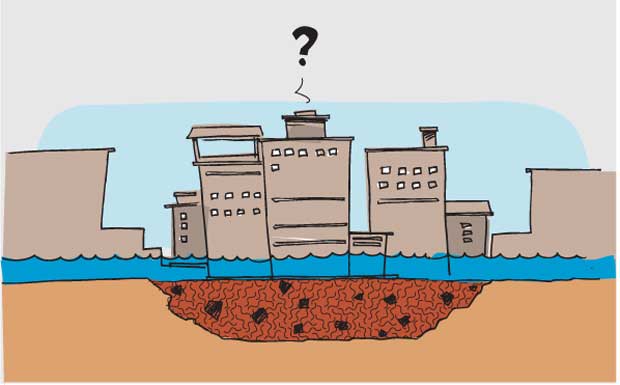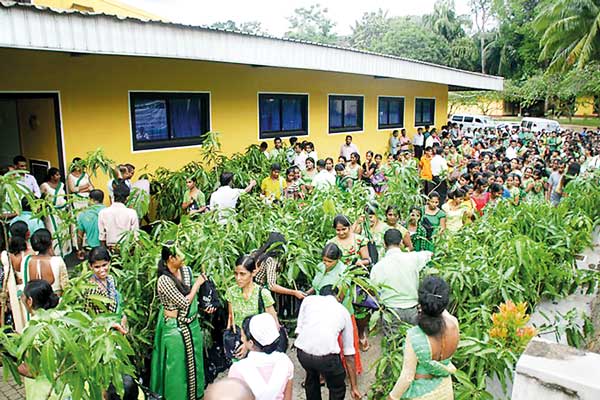
Don’t destroy our biological supermarkets

With the deluge continuing and hundreds of thousands of people seriously affected by the worst flood havoc in recent decades, we wish to focus attention today on how much the construction of housing schemes and other buildings on what were once wetlands or marshlands has contributed towards the calamity.
For instance in the suburbs of Colombo city, a wetland including an ancient stream was apparently bought at a lower price, covered up and luxury two storey houses built at a sale price of Rs. 20 million each. Last week the ground floors of most of those houses were covered by dirty or muddy flood water and the residents had to flee. Most of them are not likely to return. This is one of the many instances where houses or buildings in wetlands faced a catastrophe. Besides the take-over of wetlands, the Daily Mirror in its Editorial on Monday referred to the excessive or illegal rock blasting and sand mining which had been carried out on a large scale with political patronage for the last decade or more.
According to scientific analysts, when an area flooded with water, wetlands act like a giant sponge. This is because the living plants and even the dead plants can absorb the extra water. By doing this, wetlands also help slow down the movement of this water to surrounding areas where people may have houses. So, having wetlands in areas where there is regular flooding may save your houses.
Scientists say wetlands are important features in the landscape that provide numerous beneficial services for people, fish and wildlife. Some of these services, or functions, include protecting and improving water quality, providing fish and wildlife habitats, storing flood waters and maintaining surface water flow during dry seasons.
These valuable functions are the result of the rare natural characteristics of wetlands.Wetlands are among the most productive ecosystems in the world, comparable to rain forests and coral reefs. An immense variety of species of microbes, plants, insects, amphibians, reptiles, birds, fish and mammals can be part of a wetland ecosystem. Scientists say the complex, dynamic relationships among the organisms inhabiting the wetland environment are called food webs.
Wetlands can be thought of as “biological supermarkets.” They provide great volumes of food that attract many animal species. These animals use wetlands for part of or all of their life-cycle. Dead plant leaves and stems break down in the water to form small particles of organic material called “detritus.” This enriched material feeds many small aquatic insects, shellfish and small fish that are food for larger predatory fish, reptiles, amphibians, birds and mammals. All these are destroyed when apartment complexes or other building are constructed on wetlands. The Government must stop this now as part of Sri Lanka’s contribution to the battle against climate change.
The functions of a wetland and the values of these functions to humans depend on a complex set of relationships between the wetland and the other ecosystems in the watershed. A watershed is a geographic area in which water, sediments and dissolved materials drain from higher elevations to a common low-lying outlet or basin a point on a larger stream, lake underlying aquifer or estuary.
Scientists believe wetlands play an integral role in the ecology of the watershed. The combination of shallow water, high levels of nutrients and primary productivity is ideal for the development of organisms that form the base of the food web and feed many species of fish, amphibians, shellfish and insects. Many species of birds and mammals rely on wetlands for food, water and shelter, especially during migration and breeding.
Wetlands’ microbes, plants and wildlife are part of the global cycles for water, nitrogen and sulphur. Scientists now know that atmospheric maintenance may be an additional wetlands function. Wetlands store carbon within their plant communities and soil instead of releasing it to the atmosphere as carbon dioxide. Thus wetlands help to moderate global climate conditions.
Far from being useless, disease-ridden places, wetlands provide values that no other ecosystem can. These include natural water quality improvement, flood protection, shoreline erosion control, opportunities for recreation and aesthetic appreciation and natural products for our use at no cost. Protecting wetlands can protect our safety and welfare
(Source: 24 May 2016 Daily Mirror (Sri Lanka) : http://www.dailymirror.lk/109920/Don-t-destroy-our-biological-supermarkets-EDITORIAL#sthash.572Lkf4u.dpuf)

Kolonna garment factory distributes 800 mango plants to save environment
The Bernard Social Service Programme of the Bernard Boteju Garment Factory in Kolonna distributed 800 mango plants as a part of the campaign initiated by Moratuwa University Post Graduate Students’ Re-forest Sri Lanka Association to plant 84,000 trees.
More than 650 employees of the factory and the residents of the area received mango plants of the Karthakolomban variety. Factory administration advised the beneficiaries refrain from using synthetic fertilizer and to use only compost.
Kolonna Divisional Secretary S.M.D. Samarasekara said the community service of the Bernad Garment Factory set an example for the country. He pointed out that Kolonna area was facing a series of environmental issues.
Managing Director, Janak Boteju said he was impressed by the post graduate students’ campaign to plant 84,000 trees and implement the plant distribution programme which cost more than Rs.200,000 to the factory. He said he was planning to continue the programme in the years to come.

(Source : 23 May 2016 :Daily Mirror (Sri Lanka) http://www.dailymirror.lk/109848/Kolonna-garment-factory-distributes-mango-plants-to-save-environment)



